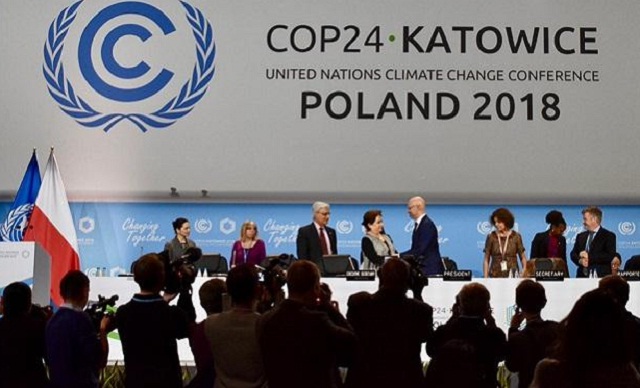
Katowice, Poland | AFP | Nations most threatened by rising sea levels and devastating droughts will use a UN summit in Poland on Monday to urge richer countries to pay their fair share in the climate change fight.
The presidents of at-risk states such as Honduras, Nigeria and Bangladesh are expected at COP24 talks, which aim to flesh out the promises agreed in the 2015 Paris climate accord.
But host Poland — heavily reliant on energy from coal — will push its own agenda: a “just transition” from fossil fuels that critics say could allow it to continue polluting for decades.
The Paris deal saw nations agree to limit global temperature rises to below two degrees Celsius (3.6 Fahrenheit) and under 1.5C if possible.
Delegates from nearly 200 countries now have two weeks of negotiations to finalise how those goals work in practice, even as science suggests the pace of climate change is rapidly outstripping mankind’s response.
One of the key disputes is finance.
Under Paris, richer nations — responsible for the majority of historic greenhouse gas emissions — are expected to contribute funding that developing nations can access to make their economies greener.
But US President Donald Trump’s decision to withdraw from the Paris accord has dented trust among vulnerable nations, who fear there is not enough cash available to help them adapt to our heating planet.
The World Bank on Monday announced $200 billion (175 billion euros) in climate action investment for 2021-25 — a major shot in the arm for green initiatives but one which needs bolstering by state-provided funding.
The background to Monday’s summit could hardly be bleaker: with just one Celsius of warming so far Earth is bombarded with raging wildfires, widespread crop failures and super-storms exacerbated by rising sea levels.
“A failure to act now risks pushing us beyond a point of no return with catastrophic consequences for life as we know it,” said Amjad Abdulla, chief negotiator at the COP24 for the Alliance of Small Island States.
– Coal controversy –
The UN’s own expert climate panel in October issued its starkest warning to date.
To have any hope of reaching the 1.5C goal by the end of the century, it said emissions from fossil fuel use must be halved by 2030.
Poland is one of many nations heavily reliant on coal, and wants this round of talks to reflect the role fossil fuels play in its economy.
It will unveil a declaration calling on states to “recognise the challenges faced by sectors, cities and regions in transition from fossil fuels… and the importance to ensure a decent future for workers impacted by the transition.”
Alden Meyer, of the Union of Concerned Scientists, told AFP that while there was a responsibility to ensure fossil fuel workers were not abandoned as the world switches away from non-renewables, the need for speed was pressing.
“We don’t have decades and centuries to make the transition away from fossil fuels, the way we did from wood to coal, and coal to oil,” he said.
For some nations, the time to adapt to the effects of climate change is already here.
Frank Bainimarama, Prime Minister of Fiji and president of last year’s COP, said Poland’s submission must result in “a just transition for everyone, especially the most climate vulnerable.”
 The Independent Uganda: You get the Truth we Pay the Price
The Independent Uganda: You get the Truth we Pay the Price



